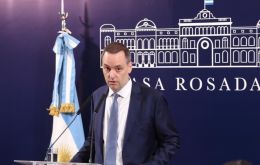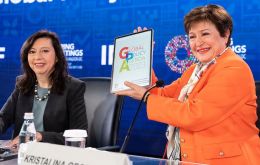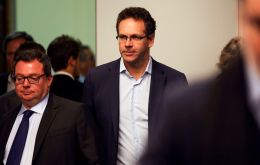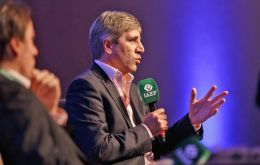MercoPress. South Atlantic News Agency
Tag: Luis Caputo
-
Saturday, December 16th 2023 - 10:02 UTC
Presidential Spokesman warns Argentina going through hyperinflation

Argentina's Presidential Spokesman Manuel Adorni Friday confirmed his country was going through hyperinflation since the 1% daily rate mentioned earlier this week by Economy Minister Luis Toto Caputo would result in a 3,678% per annum.
-
Friday, December 15th 2023 - 10:55 UTC
Argentina: Inflation is 1% daily, Caputo says

Argentine Economy Minister Luis Toto Caputo said Thursday that inflation in his country stood already at 1% per day and insisted that measures were being taken to get out of this “financial catastrophe” through a classic orthodox stabilization plan. “We are in that process, but we are very confident,” he stressed.
-
Wednesday, December 13th 2023 - 10:59 UTC
Argentina: Devaluation and austerity measures announced

Argentina's Economy Minister Luis Toto Caputo Tuesday admitted people would be worse off for a couple of months while announcing in a recorded message the new measures adopted by the administration of President Javier Milei to bounce back from the deep crisis.
-
Wednesday, December 13th 2023 - 10:58 UTC
Thumbs up from the IMF to Argentina's policy changes

After Argentina's Economy Minister Luis Toto Caputo announced Tuesday in Buenos Aires a series of measures to tackle inflation, the Communications Director of the International Monetary Fund (IMF) Julie Kozack said in a statement that “these strong initial actions aim to significantly improve public finances in a way that protects the most vulnerable in society and to strengthen the exchange rate regime.”
-
Friday, December 8th 2023 - 10:10 UTC
IMF official highlights importance of BCRA in tackling inflation

International Monetary Fund (IMF) Communications Director Julie Kozack Thursday insisted during a press conference at the agency's headquarters in Washington that Argentina must have a “strong and credible” Central Bank to reduce inflation under future President Javier Milei. In Kozack's view, high prices are one of the most important imbalances the country needs to tackle.
-
Thursday, December 7th 2023 - 10:59 UTC
Milei reaches out to Elon Musk and confirms Central Bank head

Argentina's President-elect Javier Milei said Wednesday that he spoke “extensively” on the telephone with tycoon Elon Musk, who shall not be attending the Dec. 10 inauguration in Buenos Aires.
-
Monday, November 27th 2023 - 10:18 UTC
Milei off to US for talks with IMF, WB, and Biden's administration

Argentina's President-elect Javier Milei left Sunday evening for the United States to meet with officials from the Joseph Biden administration and creditor organizations such as the International Monetary Fund (IMF) and the World Bank (WB), it was reported in Buenos Aires
-
Tuesday, September 25th 2018 - 21:35 UTC
Who is Guido Sandleris, Argentina's Central Bank president after the surprise resignation of Caputo

The resignation of Luis Caputo to the Presidency of the Central Bank of Argentina (BCRA), which has been reflected with surprise by the international media, occurs amid the trip of the Argentine President, Mauricio Macri, to New York to attend the Assembly General of the UN and with the mission of restoring the confidence of the international market in the Argentine economy. His predecessor, Guido Sandleris, receives a Central Bank when it is about to close an agreement with the International Monetary Fund (IMF).
-
Tuesday, September 25th 2018 - 19:04 UTC
Argentine Central bank governor resigns for personal reasons: Peso slides 5% against the US dollar

The governor of Argentina's central bank, Luis Caputo resigned on Tuesday for personal reasons, the bank said in a statement, a surprise announcement in the midst of the country's talks with the IMF that sent the peso tumbling. Former finance minister Caputo has only held the role since June and is the second Argentine central bank president to resign this year. Argentina's peso currency slid 4.65% to open at 39.15 per U.S. dollar after the announcement, traders said.
-
Friday, September 21st 2018 - 08:47 UTC
Argentine Peso at an equilibrium point, says head of Central bank

Argentina’s central bank now sees the Peso at an equilibrium level, chief Luis Caputo told market participants who attended a meeting with him on Thursday. The statement comes after two days of strengthening by the peso following a rout that sent it to a record intra-day low in late August.
